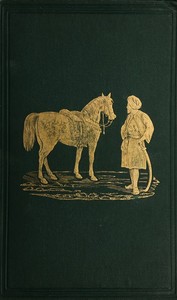The Horses of the Sahara and the Manners of the Desert by E. Daumas
"The Horses of the Sahara and the Manners of the Desert" by E. Daumas is a detailed treatise likely written in the mid-19th century that explores the significance of horses in Arab culture, particularly in the Sahara desert. This work combines observations of horse breeding, anatomy, and training with cultural anecdotes and insights into the lifestyles and traditions of the Bedouin tribes. Daumas aims to illuminate the relationship between the Arabs and
their horses, emphasizing both the practical and the spiritual connections that shape their lives. At the start of the book, the author introduces the importance of horses within Arab society, highlighting their roles in warfare, trade, and daily life. Daumas reflects on his extensive experience in Africa and interactions with various tribes, showcasing his intent to provide an authentic account based on firsthand observations and discussions with the Emir Abd-el-Kader. The opening portion sets up a narrative that intertwines historical context with personal anecdotes to establish the horse's status not merely as an animal but as a vital companion and symbol of Arab identity, loyalty, and honor. (This is an automatically generated summary.)
Read or download for free
| How to read | Url | Size | |||
|---|---|---|---|---|---|
| Read now! | https://www.gutenberg.org/ebooks/51041.html.images | 689 kB | |||
| EPUB3 (E-readers incl. Send-to-Kindle) | https://www.gutenberg.org/ebooks/51041.epub3.images | 407 kB | |||
| EPUB (older E-readers) | https://www.gutenberg.org/ebooks/51041.epub.images | 410 kB | |||
| EPUB (no images, older E-readers) | https://www.gutenberg.org/ebooks/51041.epub.noimages | 350 kB | |||
| Kindle | https://www.gutenberg.org/ebooks/51041.kf8.images | 570 kB | |||
| older Kindles | https://www.gutenberg.org/ebooks/51041.kindle.images | 523 kB | |||
| Plain Text UTF-8 | https://www.gutenberg.org/ebooks/51041.txt.utf-8 | 610 kB | |||
| Download HTML (zip) | https://www.gutenberg.org/cache/epub/51041/pg51041-h.zip | 355 kB | |||
| There may be more files related to this item. | |||||
Similar Books
About this eBook
| Author | Daumas, E. (Eugène), 1803-1871 |
|---|---|
| Translator | Hutton, James, 1818-1893 |
| Title | The Horses of the Sahara and the Manners of the Desert |
| Credits |
Produced by MWS, readbueno and the Online Distributed Proofreading Team at www.pgdp.net (This file was produced from images generously made available by The Internet Archive) |
| Reading Level | Reading ease score: 74.5 (7th grade). Fairly easy to read. |
| Language | English |
| LoC Class | SF: Agriculture: Animal culture |
| Subject | Arabian horse |
| Subject | Sahara |
| Category | Text |
| EBook-No. | 51041 |
| Release Date | Jan 25, 2016 |
| Most Recently Updated | Oct 22, 2024 |
| Copyright Status | Public domain in the USA. |
| Downloads | 477 downloads in the last 30 days. |
| Project Gutenberg eBooks are always free! | |

